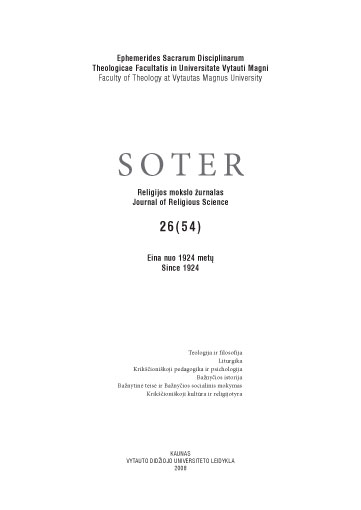Teologinio pašaukimo suvokimo svarba profesinės veiklos įprasminimui
THE SIGNIFICANCE OF THE CONCEPT OF THE THEOLOGICAL VOCATION IN THE PROVIDING A SENSE TO THE PROFESSIONAL ACTIVITY
Author(s): Eugenijus DanilevičiusSubject(s): Christian Theology and Religion
Published by: Vytauto Didžiojo Universitetas
Keywords: teologinis pašaukimas; profesinis pašaukimas; profesinio pašaukimo praktinė raiška; profesinio pašaukimo praktinės raiškos etapai; theological vocation; professional vocation; practical manifestation of the professional vocation; stages of the practical m
Summary/Abstract: The identification and realization of vocation determines person‘s attitude to professional activity, exerting a crucial impact upon the person‘s work quality and productivity, successful career, personality self-realization and development, providing sense to person‘s existence. The article is based on the methodological foundations formulated in the analysis of the Holy Bible, Catechism of the Catholic Church (1996), decisions of the Ecumenical Vatican II Meeting (1965); Magisterial document of the Catholic Church “New Callings for the New Europe” (1999), the works by Jonas Paulius II (1989, 1994, 1996), K. Paltarokas (1928), S. Šalkauskis (1992), J. Gobis (1928), M. Weber (1969, 2000) and other scientists. The following research questions were raised in the article: what is the dynamics of professional vocation during which profession becomes an indispensable part of personality transcendental function and interior-spiritual human life? How to reduce the contradiction between the objective and subjective aspects of profession? What is the place of theological and professional vocation providing sense to professional activity? How can professional vocation be modeled and managed purposefully? Due to inadequately chosen profession a person experiences existential vacuum which, according to V. E. Frankl, causes aggression, depression and formation of addictions. These destructive factors destroy personality and can lead to drug addiction, crimes or suicides. Te model of the practical manifestation of the professional vocation, developed in the research, sets a purpose to help a person to better learn about his own individual vocation in the process of initial vocational education and training and provide meaningfulness to person‘s existence through his vocational activity. The origin of professional vocation concept and its typology was revealed, the concepts of personality professional interiorisation and its essential element – professional vocation – were conceptualized on the basis of the research by R. Laužackas (1999), R. Zedler (1933), G. Mensching (1957), A. Fischer (1967), M. Schmiel (1976) and others. It was determined that theological vocation is defined as the first “expression of subjective aspect of profession”, which in the flow of times gave rise to the types of vocation. On the grounds of the insight by Jonas Paulius II (1996), the definition of vocation was formulated: “The history of vocation of every Christian is the history of God’s and man’s inexpressible dialogue – the history of the freedom dialogue between the calling God’s love and the man responding with love“. The main direction of vocation: to seek for perfection (holiness) with the help of love. Practical manifestation of professional vocation consists of three components: God’s and man’s love dialogue, personality inclinations, skills, professional interests and demands of the world of work. In an ideal case these components interact maintaining a balance. Howe
Journal: SOTER: religijos mokslo žurnalas
- Issue Year: 54/2008
- Issue No: 26
- Page Range: 59-70
- Page Count: 12
- Language: Lithuanian

